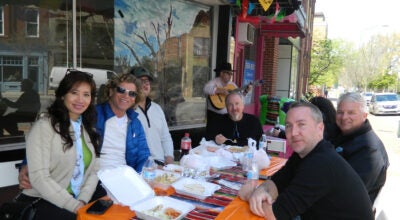City council approves changes to rules for businesses operating in homes
Published 12:00 am Wednesday, March 18, 2015
By David Purtell
david.purtell@salisburypost.com
Salisbury City Council approved changes to the city’s policy on running a business out of a home during Tuesday’s meeting.
The changes are meant to make sure homes are, first and foremost, homes, according to city officials.
The policy on “home occupation” is in the city’s Land Development Ordinance and deals specifically with single-family homes.
One change in the language states a home occupation shall occupy no more than 300 square feet of the “gross living area” in the home, excluding finished or unfinished basements or accessory structures. The language previously said no more than “30 percent or 500 square feet.” But now one business is limited to 300 square feet and more than one is limited to 30 percent or 500 square feet (whichever is less).
A new subsection states: “Except for equipment or materials of a type and quantity that could reasonably be associated with the principal residential use,” outdoor storage of items associated with the home occupation is not allowed in strictly residential areas.
The changes stem from complaints the city received about heavy equipment being stored at homes in neighborhoods.
But in areas that are zoned Residential Mixed-Use, Institutional Campus and Manufactured Home Development, items associated with the home occupaton can be stored in the back yard as long as they can’t be seen from the street or a adjacent property. In Rural Residential areas, items can be stored outside as long they can’t be seen from the street or adjacent residential property.
Also, oversized commercial vehicles and utility trailers, as defined by municipal ordinance, shall not be permitted in connection with a home occupation.
Another change states: excluding in a basement or accessory building, goods or products associated with the occupation cannot be visible from the street or an adjacent residential property.
During the public hearing on the proposed changes, Clyde said the changes are tantamount to an invasion of privacy and that the city is losing businesses because it has too many rules.
He asked if the city would be measuring square footage in homes. And the answer is “yes,” code-enforcement officers could ask to come into a home to do an inspection regarding a home occupation, according to Planning Manager Preston Mitchell.
Residents have to obtain a permit from the city before they can legally run a business from their home, and an inspection is part of the permit process, Mitchell said.
Mitchell said the most important thing is that code-enforcement officers use common sense when dealing with issues pertaining to home occupations.
Councilman Brian Miller said it is impossible for the city to make an ordinance that fits every possible scenario when it comes to businesses that operate in a home.
Miller and Mayor Paul Woodson said they agreed with Clyde’s concerns. Miller said the overall goal is to protect neighborhoods.
Council voted 4-0 to approve the changes to the ordinance. Councilwoman Maggie Blackwell was not at the meeting.
In other business Tuesday, council:
• Adopted a resolution authorizing a sole-source maintenance contract with Motorola Solutions regarding the city’s radio system. The contract is for six years and totals $1.11 million.
• The city has worked to establish a “quiet zone” at rail crossings, meaning trains will not sound their horn when approaching the crossing. Beginning March 30, quiet zones will take affect at the E. Monroe Street, E. Council Street and E. Kerr Street crossings. Essentially establishing a quiet zone between Klumac Road and Kerr Street, according to city officials.
Because other safety measures have been put in place, the city meets the requirements to have quiet zones. Passenger trains must still sound the horn when approaching and leaving the train depot, and train engineers can still sound the horn whenever they deem it necessary.
• Carl Repsher expressed his concerns regarding his, and other’s, car being towed while he and his wife were volunteering at the free dental clinic held at Catawba College March 6. Three other cars, along with Repsher’s, were towed that day in the area around Catawba.
The cars were all parked in a no parking/tow away zone on the 2100 block of Brenner Avenue, according to Police Chief Rory Collins.
Repsher, who chairs the city’s Planning Board, said the “no parking” sign was not clearly visible. He also said one of the cars towed belongs to a patient who came to the clinic. He said police should have been more considerate of the situation.
Collins said the city, residents and officials of Catawba College have had lots of discussion regarding parking issues in the area and that his officers were just doing their job when writing the tickets — four total in the area on March 6 and two on March 7. He said officers couldn’t have known whether the vehicles belonged to people at the clinic, and that picking and choosing who to give a ticket to would bring the department’s integrity into question.
Councilman Miller said it all comes to communication.
“Shame on us” if it happens again next year, he said.
Also:
• Next week, Monday through Friday, Public Services will pick up old appliances, tires without rims (limit five per location) and extra bagged trash from residential customers. Residents should place the items at the curb on their regular collection day before 7 a.m. Building materials and electronics cannot be collected. Next week is also the last week for loose leaf collection. For additional information or questions contact Public Services at 704-638-5260
• The Parks and Recreation Department will hold an Easter Egg Hunt and Community Fun Day March 28 from 11 a.m. until 1 p.m. at Kelsey Scott Park. The egg hunt will begin at 12:30 p.m. There will also be games, a bounce house and the Easter Bunny. The event is free and open to the public.
Contact Reporter David Purtell at 704-797-4264.



